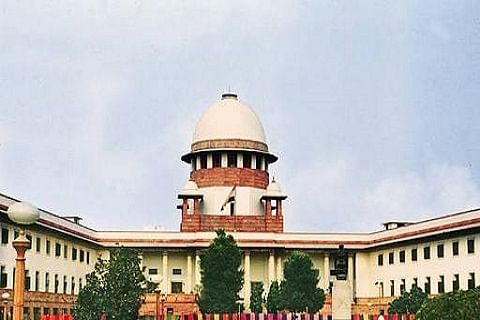Persons of influence owe a duty and have to be “more responsible” while exercising the right to free speech keeping in view their “reach, impact and authority” they yield on the general public, the Supreme Court said on Monday.
The top court dealt with various aspects of free speech and the hate speech and said that later has no “redeeming or legitimate purpose other than hatred towards a particular group”.
“In a polity committed to pluralism, hate speech cannot conceivably contribute in any legitimate way to democracy and, in fact, repudiates the right to equality,” it said. The observations were expressed by the top court in its judgement by which it refused to quash several FIRs lodged against TV anchor Amish Devgan for his alleged defamatory remarks on Sufi saint Khwaja Moinuddin Chisti during a show on June 15.
A bench of Justices A M Khanwilkar and Sanjiv Khanna said “persons of influence, keeping in view their reach, impact and authority they yield on the general public or the specific class to which they belong, owe a duty and have to be more responsible. They are expected to know and perceive the meaning conveyed by the words spoken or written, including the possible meaning that is likely to be conveyed.
“With experience and knowledge, they are expected to have a higher level of communication skills. It is reasonable to hold that they would be careful in using the words that convey their intent. The reasonable-man’s test would always take into consideration the maker…,” the judgement said.
It, however, said that its views do not mean to say that persons of influence like journalists “do not enjoy the same freedom of speech and expression as other citizens”.
The bench said that debates on controversial and sensitive topics and the right to express one’s views is a “protected and cherished right in our democracy” and “its observations are not to say that persons of influence or even common people should fear the threat of reprisal and prosecution, if they discuss and speak about controversial and sensitive topics relating to religion, caste, creed, etc.”
Participants in such discussions can express “divergent and sometimes extreme views”, but should not be considered as ‘hate speech’ by itself, as subscribing to such a view would stifle all legitimate discussions and debates in the public domain, it said.
“Many a times, such discussions and debates help in understanding different view-points and bridge the gap. Question is primarily one of intent and purpose. Accordingly, ‘good faith’ and ‘no legitimate purpose’ exceptions would apply when applicable,” it said.
It said that a universal definition of ‘hate speech’ remained difficult, except for one commonality that ‘incitement to violence’ is punishable.
“Therefore, constitutional and statutory treatment of ‘hate speech’ depends on the values sought to be promoted, perceived harm involved and the importance of these harms,” it said.
The judgement said the law of ‘hate speech’ recognises that all speakers are entitled to ‘good faith’ and ‘(no)-legitimate purpose’ protection. “‘Good faith’ means that the conduct should display fidelity as well as a conscientious approach in honouring the values that tend to minimise insult, humiliation or intimidation,” it said, adding that ‘Hate speech’ has no redeeming or legitimate purpose other than hatred towards a particular group.






